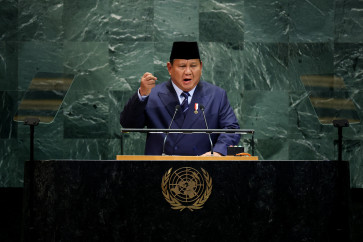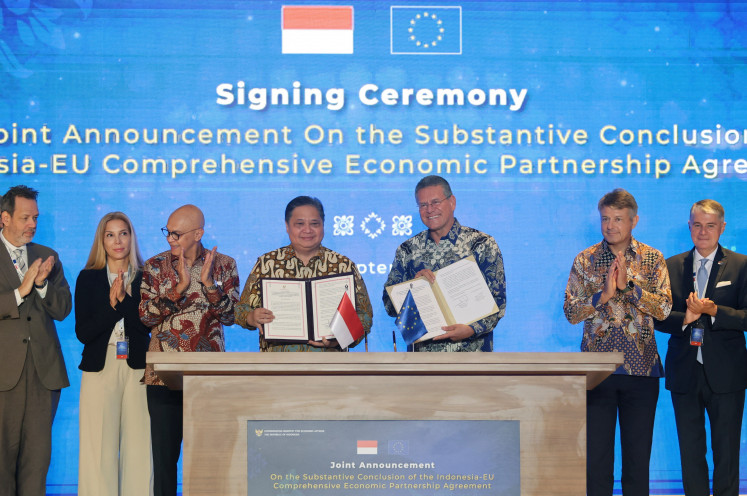Popular Reads
Top Results
Can't find what you're looking for?
View all search resultsPopular Reads
Top Results
Can't find what you're looking for?
View all search resultsJobs law enters decisive battle in Constitutional Court
The error reflects poor quality of the government’s lawmaking capacity.
Change text size
Gift Premium Articles
to Anyone
A
fter a long road, President Joko “Jokowi” Widodo finally enacted the Job Creation Law as Law No. 11/2020. The law is seen as a masterpiece of Jokowi’s government in his second term, a fulfillment of his campaign promises and a form of regulatory review of the complex licensing and bureaucracy that has hindered economic growth.
However, the State Secretariat slipped in the final stage: the harmonization and synchronization of the provisions contained in the law. There appears to be a typo error in Article 6, which refers to Article 5 paragraph (1), while Article 5 stands alone and has no paragraph. Therefore, State Secretary Pratikno told the media the incident was an administrative technical error.
In soccer, such an error is akin to a mistake committed inside the penalty box in a crucial moment that defines a quality striker. Dutch soccer legend Johan Cruyff was correct when he said, “Football is a game of mistakes, whoever makes the fewest mistakes wins”. As in soccer, the harmonization process of the omnibus law demands perfection.
Inaccuracy in synchronization and harmonization has only exacerbated the polemic that has plagued the legislation from the beginning. The error reflects poor quality of the government’s lawmaking capacity.
Is this error just a small mistake that has no serious impact on the implementation of the law? Maybe. However, it should be noted carefully that the formulation of Article 6 of the law does not fulfill one of the elements of the Principles for the Formation of Good Legislative Procedures as stipulated in Article 5 of Law No. 12/2011 on legislation making, namely the principle of clarity of formulation.
Can the non-compliance of these principles be overlooked in the implementation stage? The answer must be returned to the noble ideals of the Job Creation Law, namely regulatory review as an effort to clarify a rule and not the other way around.
Even if there is a practical way, which is called the distribution mechanism II – something that has been in place and practiced when the government responds to inaccurate preparation of legal documents such as laws – a wrong revision mechanism is certainly not a good lesson for the public.
Basically, the government must refer back to the procedure of submitting revisions of a law by meeting the criteria of “certain circumstances” as stipulated in Article 23 (2) of Law No. 15/2019, which amends Law No. 12/2011.
However, if the mechanism for submitting a revised bill based on Law No.15/2019 is also deemed to have not resolved the fundamental problems behind the discussion, ratification and promulgation of the Job Creation Law, such as the principle of openness, then filing a judicial review motion with the Constitutional Court is a necessity for the relevant parties to test their arguments.
Therefore, there are several things that need to be considered when the Job Creation Law is challenged at the court. First, petitioners should not only be limited to citizens whose constitutional rights have potentially been harmed, but also political parties whose aspirations or interests were ignored during the deliberation of the job creation bill. The combination of political parties and civil society as petitioners will reflect the strengthening of legal consciousness, which is part of the legal culture.
Second, legitimate mobilization of all resources is an option that the petitioners can consider. It will be interesting to observe, however, whether the mobilization is initiated by the elite or civil society. Another important element in this mechanism are the masses, which can accelerate the mobilization.
President Jokowi has called on parties who are dissatisfied with the Job Creation Law to file a judicial review motion. The President’s choice of the dispute resolution through the Constitutional Court constitutes the judicialization of politics. This is a form of expanding the role of the judiciary and the judges’ power in adjudicating a public policy. In another sense, the judiciary and the panel of judges are deeply involved in reshaping policies and entering into controversial political vortices.
Through its power, the court’s final decision is a form of justification or dejustification of government policy, in this case the Job Creation Law. The court will conduct an abstract, rather than concrete, review of the law.
Concerning the involvement of the Constitutional Court in the polemic surrounding the Job Creation Law, judicial behavior of the judges will matter. Based on the political jurisprudence, although the Constitutional Court is an independent institution, the behavior of its judges cannot be separated from their professional responsibility to the public, certain ideological views or political ideas, closeness to political elites, and strategic considerations of the cases they face. It is not surprising that the perspective of political jurisprudence is defined by the vision of the judiciary as political agencies and judges as political actors.
Thus, the judicial review of the Job Creation Law is a political event that will come under the public’s scrutiny. The public will closely watch the Constitutional Court to see whether it will make a proper political judgment based on the correct legal principles or issue an inappropriate political judgment but based on correct legal principles.
***
The writer is a researcher at Department of Politics and Political Change, Centre for Strategic and International Studies, Jakarta.

![Priorities: A protester holds a sign that reads “Overcome the virus, withdraw the omnibus [law]” during a protest on Nov. 12 outside the House of Representatives in Senayan, Central Jakarta. Workers continue to demand that the government repeal the newly passed Omnibus Law on Job Creation, while labor unions plan to challenge the law at the Constitutional Court.](https://img.jakpost.net/c/2020/11/18/2020_11_18_107550_1605717358._large.jpg)








